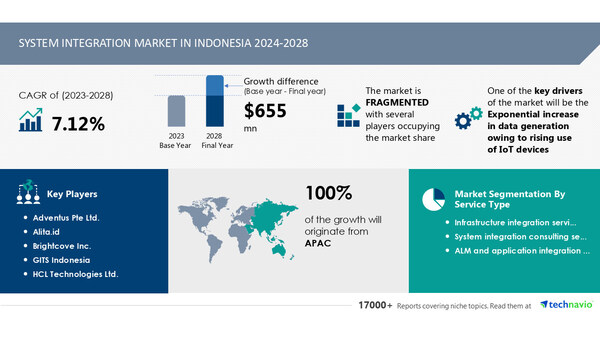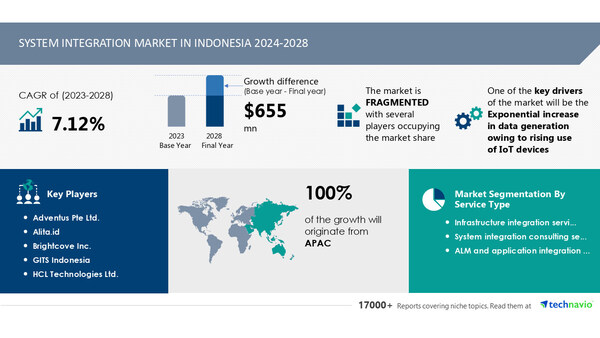Indonesia System Integration Market to Grow by USD 655 Million (2024-2028) Driven by IoT Data Surge, AI-Powered Market Insights – Technavio
Report on how AI is driving market transformation- The global system integration market in Indonesia size is estimated to grow by USD 655 million from 2024-2028, according to Technavio. The market is estimated to grow at a CAGR of 7.12% during the forecast period. Exponential increase in data generation owing to rising use of iot devices is driving market growth, with a trend towards emergence of industry 4.0 and digitalization in various industries. However, need for substantial investments in implementing and maintaining system integration poses a challenge. Key market players include Adventus Pte Ltd., Alita.id, Brightcove Inc., GITS Indonesia, HCL Technologies Ltd., Kemana, Kitameraki, Mitrais, Nocola IoT Solution, NTT DATA Corp., PACKET SYSTEMS, PT Autojaya Idetech and PT Solusi Periferal, PT Hager Electro Indonesia, PT Sysnesia Teknologi Semesta, PT XVAutomation Indonesia, PT. Delta Solusi Nusantara, PT. IIJ Solutions Indonesia, PT. Infosys Solusi Terpadu, PT. MAGNA SOLUSI Indonesia, PT. Network Data Sistem, and Zettagrid.
Get a detailed analysis on regions, market segments, customer landscape, and companies – Click for the snapshot of this report
|
Forecast period |
2024-2028 |
|
Base Year |
2023 |
|
Historic Data |
– |
|
Segment Covered |
Service Type (Infrastructure integration services, System integration consulting services, and ALM and application integration services), End-user (BFSI, Government, Telecom, Retail, and Others), Customer Type (Large Enterprises and Small and Medium Enterprises), and Geography (APAC) |
|
Region Covered |
Indonesia |
|
Key companies profiled |
Adventus Pte Ltd., Alita.id, Brightcove Inc., GITS Indonesia, HCL Technologies Ltd., Kemana, Kitameraki, Mitrais, Nocola IoT Solution, NTT DATA Corp., PACKET SYSTEMS, PT Autojaya Idetech and PT Solusi Periferal, PT Hager Electro Indonesia, PT Sysnesia Teknologi Semesta, PT XVAutomation Indonesia, PT. Delta Solusi Nusantara, PT. IIJ Global Solutions Indonesia, PT. Infosys Solusi Terpadu, PT. MAGNA SOLUSI Indonesia, PT. Network Data Sistem, and Zettagrid |
Key Market Trends Fueling Growth
The System Integration market in Indonesia is growing steadily. Companies are integrating various systems to streamline operations and enhance efficiency. This includes the integration of enterprise resource planning (ERP) systems, customer relationship management (CRM) systems, and supply chain management (SCM) systems. The use of standardized protocols and open interfaces facilitates seamless integration. Indonesian businesses are reaping the benefits of improved data flow and operational synergy. Integration also enables better decision-making and real-time insights, giving companies a competitive edge.
The System Integration Market in Indonesia is witnessing significant growth in various sectors including Aviation, Oil and Gas, Banking, Healthcare, and Cross-border investments. System integrators are in high demand for implementing Digital Infrastructure Solutions, Network Infrastructure, and Industrial Automation using IoT devices and Analytics platforms. MDS System Integration and Smpl ID are leading players in this market. Certifications, Security, and Cybersecurity measures are crucial for successful System Integration. Communication channels, Encryption protocols, Access controls, Interfaces, and Communication methods are essential components for seamless integration. Cloud technology, Hardware integration, Servers, Storage devices, and Control systems are key IT infrastructure elements. Digital transformations are driving the adoption of Cloud-based services, IoT technologies, and Data exchange. However, cyberattacks and Third-party integrations pose challenges. Generative AI, Intelligent devices, and Sensors are trending technologies. System Integrators must ensure compliance with Industrial standards and offer reliable, efficient, and secure solutions.
Discover a Comprehensive 360° Market Analysis: Understand the Impact of AI. For detailed information- Request Sample!
Market Challenges
- The System Integration market in Indonesia is growing steadily, with businesses recognizing the benefits of integrating various technology systems. This includes improving operational efficiency, enhancing data sharing, and facilitating better communication between departments. Major industries such as finance, healthcare, and manufacturing are investing in system integration solutions to streamline their operations and gain a competitive edge. Local system integrators and global technology companies are capitalizing on this trend, offering a range of services and solutions to meet the demands of the market.
- The System Integration Market in Indonesia is experiencing significant growth due to digital transformations and increasing adoption of IT infrastructure. Businesses are integrating various hardware, software, and network resources to enhance operations. However, challenges persist, including cyberattacks, data exchange between systems, and third-party integrations. Cloud-based services, IoT technologies, and AI are driving innovation, but integrating intelligent devices, sensors, and endpoints requires a gateway. Legacy infrastructure and systems pose challenges for on-premises solutions and cloud-based applications. Neo-banking services and fintech startups are integrating APIs for banking-as-a-service (BaaS), core banking, multi-channel banking, and payment systems. The startup ecosystem is leveraging cloud technologies and internet penetration for digital transformation. Network integration services are essential for 5G mobile networks, SD-WAN, fiber, and IoT. Enterprise complexity and information technology require skilled IT professionals to ensure defense and security. Industries like marine systems and telecommunication also face integration challenges.
For more insights on driver and challenges – Download a Sample Report
Segment Overview
This system integration market in Indonesia report extensively covers market segmentation by
- Service Type
- 1.1 Infrastructure integration services
- 1.2 System integration consulting services
- 1.3 ALM and application integration services
- End-user
- 2.1 BFSI
- 2.2 Government
- 2.3 Telecom
- 2.4 Retail
- 2.5 Others
- Customer Type
- 3.1 Large Enterprises
- 3.2 Small and Medium Enterprises
- Geography
- 4.1 APAC
1.1 Infrastructure integration services- Infrastructure integration services in Indonesia focus on connecting various hardware, software, networks, and systems to create an efficient business infrastructure. The digital transformation trend is driving the growth of infrastructure integration services, as companies adopt new technologies like cloud computing, big data analytics, IoT, and artificial intelligence. These services enable seamless integration of new technologies with existing systems, ensuring compatibility, scalability, and performance optimization. Additionally, cybersecurity concerns are a significant factor, as infrastructure integration services incorporate security protocols, firewalls, encryption, and authentication mechanisms to protect sensitive information and ensure regulatory compliance. The complexity of IT environments and the need for efficient data management are also contributing factors, as infrastructure integration services help consolidate data management processes, optimize storage capabilities, and implement data governance frameworks. The trend toward hybrid IT environments is further driving demand, as companies integrate on-premises systems with cloud platforms for flexibility, scalability, and cost-effectiveness. Infrastructure integration services are essential for businesses in Indonesia to achieve operational efficiency, data connectivity, application portability, and resource optimization across their IT infrastructure.
For more information on market segmentation with geographical analysis including forecast (2024-2028) and historic data ( – ) – Download a Sample Report
Research Analysis
The System Integration Market in Indonesia is experiencing significant growth due to the increasing adoption of IT infrastructure in various industries. System integration plays a crucial role in connecting hardware, software, and network resources to facilitate digital transformations. Cloud-based services, IoT technologies, and data exchange are key drivers of this market, with the internet acting as the backbone for communication and information exchange. However, the increasing complexity of enterprise systems and the threat of cyberattacks pose challenges. Defense, marine systems, telecommunication, aviation, oil and gas, banking, healthcare, and other sectors are investing in system integration to optimize operations and enhance security. IoT devices, analytics platforms, and visualization tools are essential components of system integration solutions. System integrators provide expertise in implementing security measures such as encryption protocols, access controls, interfaces, and communication channels to safeguard data and ensure seamless information flow.
Market Research Overview
The System Integration Market in Indonesia is witnessing significant growth due to the increasing adoption of IT infrastructure, System integration being a crucial part of digital transformations. Hardware, software, and network resources are key elements in system integration. Cloud-based services, IoT technologies, and digital infrastructure solutions are driving the market forward. Data exchange between various systems and devices, including smartphones, sensors, endpoints, and gateways, is facilitated by system integrators. The market is also impacted by cyberattacks, requiring robust cybersecurity measures such as encryption protocols, access controls, and communication methods. Third-party integrations, AI, and intelligent devices are also transforming the market. Industries like telecommunication, banking, healthcare, oil and gas, and defense are major consumers of system integration services. The Indonesian startup ecosystem is flourishing, with fintech startups and neo-banking services integrating with core banking systems for multi-channel banking and payment systems. Cloud technologies and internet penetration are fueling digital transformation, with 5G mobile networks, SD-WAN, fiber, and IoT playing a significant role. Enterprise complexity and information technology continue to drive the demand for system integration services.
Table of Contents:
1 Executive Summary
2 Market Landscape
3 Market Sizing
4 Historic Market Size
5 Five Forces Analysis
6 Market Segmentation
- Service Type
- Infrastructure Integration Services
- System Integration Consulting Services
- ALM And Application Integration Services
- End-user
- BFSI
- Government
- Telecom
- Retail
- Others
- Customer Type
- Large Enterprises
- Small And Medium Enterprises
- Geography
- APAC
7 Customer Landscape
8 Geographic Landscape
9 Drivers, Challenges, and Trends
10 Company Landscape
11 Company Analysis
12 Appendix
About Technavio
Technavio is a leading global technology research and advisory company. Their research and analysis focuses on emerging market trends and provides actionable insights to help businesses identify market opportunities and develop effective strategies to optimize their market positions.
With over 500 specialized analysts, Technavio’s report library consists of more than 17,000 reports and counting, covering 800 technologies, spanning across 50 countries. Their client base consists of enterprises of all sizes, including more than 100 Fortune 500 companies. This growing client base relies on Technavio’s comprehensive coverage, extensive research, and actionable market insights to identify opportunities in existing and potential markets and assess their competitive positions within changing market scenarios.
Contacts
Technavio Research
Jesse Maida
Media & Marketing Executive
US: +1 844 364 1100
UK: +44 203 893 3200
Email: media@technavio.com
Website: www.technavio.com/
SOURCE Technavio




